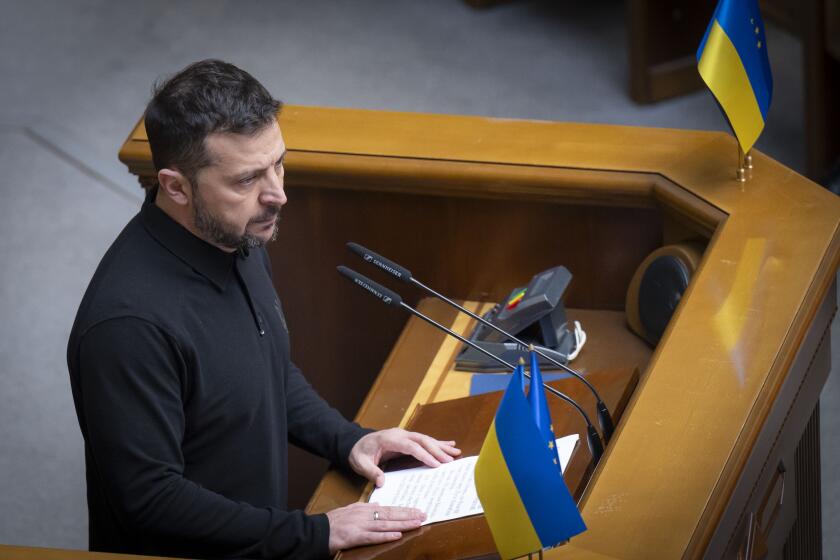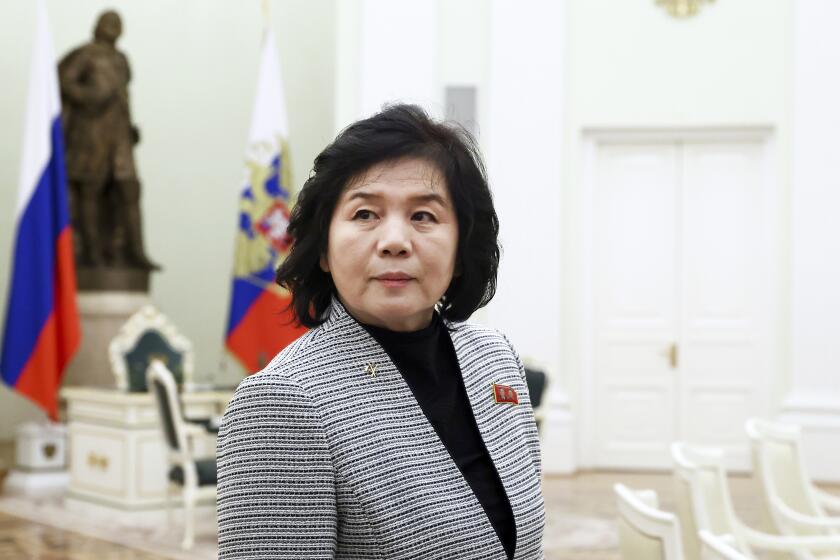Zelensky says 10,000 North Koreans could join Russian forces in Ukraine

- Share via
BRUSSELS — Ukrainian President Volodymyr Zelensky said Thursday his country has intelligence information that 10,000 troops from North Korea are being prepared to join Russian forces fighting against his country, warning that a third nation wading into the hostilities would turn the conflict into a “world war.”
Zelensky did not go into further details about the claim that came a day after U.S. Deputy Secretary of State Kurt Campbell said in Seoul that Washington and its allies are alarmed by North Korea’s military support for Russia’s war in Ukraine but couldn’t confirm Ukrainian claims that North Korean soldiers were sent to fight for Moscow.
“We know about 10,000 soldiers of North Korea that they are preparing to send [to] fight against us,” Zelensky said, calling any North Korean involvement “the first step to a world war.”
The Ukrainian leader’s comments raised the stakes for his Western allies as he met with European Union leaders and then NATO defense ministers to discuss his “ victory plan ” to end the country’s devastating war with Russia.
“If we start now and follow the victory plan, we can end this war no later than next year,” he told the EU leaders.
Both Russian President Vladimir Putin and North Korean leader Kim Jong Un say a new strategic partnership is a breakthrough, but what it means for their relationship is still uncertain.
He told reporters the plan aims “to strengthen Ukraine” and pave the way for a diplomatic solution to end the conflict on Europe’s eastern flank.
“This plan doesn’t depend on Russian will, only on the will of our partners,” he said before addressing leaders at an EU summit.
In a statement after their talks with Zelensky, the EU leaders called for a “rapid stepping up of military support and acceleration in its delivery, in particular air defense systems, ammunition and missiles” to protect Ukraine’s population and energy infrastructure.
Zelensky was later shuttling across Brussels to meet with NATO defense ministers. The EU is a key supporter of Ukraine, a candidate member of the 27-nation bloc, as it fights Russia’s invasion that began more than 2 1/2 years ago.
Zelensky outlined the five-point plan to Ukraine’s parliament on Wednesday without disclosing confidential elements that have been presented in private to key allies, including the United States.
Major points of the plan include permission to use Western-supplied longer-range missiles to strike military targets deep inside Russian territory.
Major points of the plan include an invitation for Ukraine to join NATO and permission to use Western-supplied longer-range missiles to strike military targets deep inside Russia, steps that have been met with reluctance by Kyiv’s allies so far.
“If we get this sign that we will be in NATO, we will feel that we are not alone,” Zelensky said.
Hungarian Prime Minister Viktor Orbán, widely seen as having the warmest relations of any EU leader with Russian President Vladimir Putin, called Zelensky’s plan “more than frightening” in a Facebook post and said he would urge major EU powers France and Germany to “begin negotiations with the Russians as soon as possible, in order to find a way out of this situation.”
NATO Secretary-General Mark Rutte said Thursday that Kyiv can rest “absolutely assured that 32 allies are united in making sure that collectively, we will do whatever is needed to make sure that Ukraine can prevail, that [Russian President Vladimir] Putin will not get his way.”
Rutte reiterated that Ukraine’s place is among NATO’s ranks, but he would not say when it might join.
The agreement, which includes a vow of mutual aid if either country faces ‘aggression,’ appears to be the strongest since the Cold War.
On Wednesday, he said NATO did not have confirmation of claims of thousands of North Korean troops preparing to join the war, but said the Asian nation already is “supporting the war effort” in other ways through its ties with Russia.
Zelensky told EU leaders that his troops must keep battling Russian forces in Ukraine “while also bringing the war back into Russia so that Russians can feel what war is like and begin to hate Putin for it.”
Zelensky said he needs to “move some partners forward” on the issue. “And I think only with the unity in EU we can move and can move not only EU leaders, we can move other leaders.”
A draft copy of EU summit conclusions — a text that will likely be tweaked before publication at the end of Thursday’s meeting — reaffirms the bloc’s “unwavering commitment to providing continued political, financial, economic, humanitarian, military and diplomatic support to Ukraine and its people for as long as it takes and as intensely as needed. Russia must not prevail.”
Thursday’s talks in Brussels come as Ukrainian troops are struggling to hold off better-equipped Russian forces, especially in the eastern Donetsk region where they are gradually being pushed back. Kyiv is surviving with Western help, but Ukraine says it is coming too slowly.
The North Korean Foreign Ministry highlighted Putin’s intention to visit after meetings with the Russian president and foreign minister in Moscow last week.
Lithuanian President Gitanas Nauseda criticized slow Western decision-making over Ukraine and said it “would be a great mistake to think that our hesitance is the best way to de-escalation.”
At their summit in Washington in July, the 32 NATO members declared Ukraine on an “irreversible” path to membership.
But for now, NATO is in a holding pattern. Its biggest and most powerful member, the United States, is facing a presidential election. European allies expect little movement on Ukraine until a new president takes office in January.
Beyond that, the United States and European heavyweight Germany remain deeply concerned about being dragged into a wider war with nuclear-armed Russia, and they lead a group of countries that oppose allowing Ukraine to join NATO until the conflict ends.
Cook, Corder and Casert write for the Associated Press. Corder reported from The Hague. Associated Press reporter Geir Moulson in Berlin contributed.
More to Read
Sign up for Essential California
The most important California stories and recommendations in your inbox every morning.
You may occasionally receive promotional content from the Los Angeles Times.














